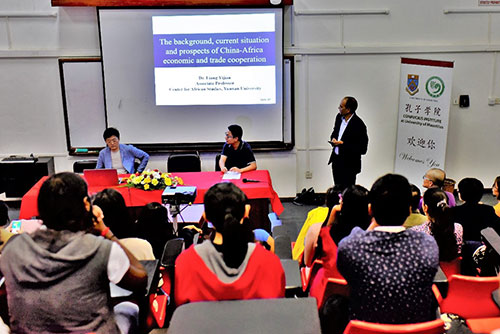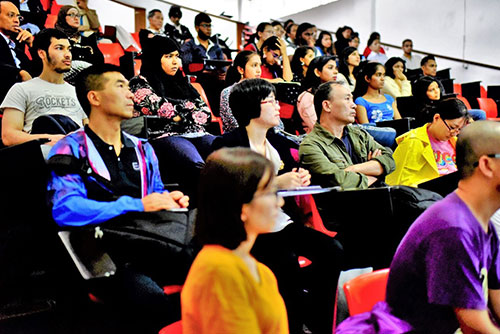CI-UoM organized a talk series in collaboration with Yunnan University, China at UoM.
Professor Wu Lei, Dean of the Institute of International Relations; Associate Professor Wang Tao, Institute of International Relations; Associate Fellow, Dr Liang Yijian, Mr Cao Fengyu, PhD Candidate and Ms Deng Rongxiu were warmly welcomed by the Directors of CI-UoM and the audience.
Yunnan University is one of the largest and most prestigious universities in China. Its main campuses are located in the provincial capital city of Kunming. Founded in December 1922, Yunnan University has now developed into a National Key University with a large group of academic professionals offering courses in the fields of the liberal arts, law, science, technology, economics, and management.
There are about 20,000 students studying on the campus of Yunnan University undertaking various UG, PG, and Doctoral Degrees and courses.
Dr. Liang Yijian, Associate Professor at the Center for African Studies, Yunnan University, China gave an overview of “The Background, Current Situation and Prospects of China-Africa Economic and Trade Cooperation.” He expanded on the importance and increasing recognition of many African countries as an economic partner. Africa and China have known similar developmental stages and have traditional friendly cooperative relations. Africa attracts more and more Chinese enterprises, especially since the establishment of the Forum On China-Africa Cooperation (FOCAC) in 2000. China-Africa economic and trade cooperation has clearly accelerated and reached remarkable heights. At present, China-Africa cooperation is entering a new era and the main areas of focus are on infrastructure construction, upgrading of capacity cooperation, and promotion of endogenous development capabilities in Africa whilst adhering to the principle of mutual benefit and, following the path of green and sustainable cooperation.
Mr Cao Fengyu, Ph.D. Candidate at the Center for African Studies talked about the “The History and Future of China-Africa Energy Cooperation”. He mentioned that Africa has become the second important source of China’s oil imports. With the transformation and upgrading of China-Africa cooperation and the “new normal” phase of China’s economy, China-Africa energy cooperation has broad prospects for development. As China-Africa energy cooperation deepens, they also have to face challenges such as economic simplification, inadequate infrastructure and social instability in some African countries. The presentation summarized the history of China-Africa energy cooperation, and gave a forecast of its future development based on current opportunities and challenges.

Plate 1. Director of CI-UoM introducing the speaker at the talk series on ‘China-Africa’

Plate 2. A snapshot of the audience consisting of CI-UoM staff and students
